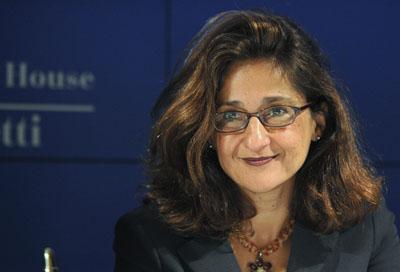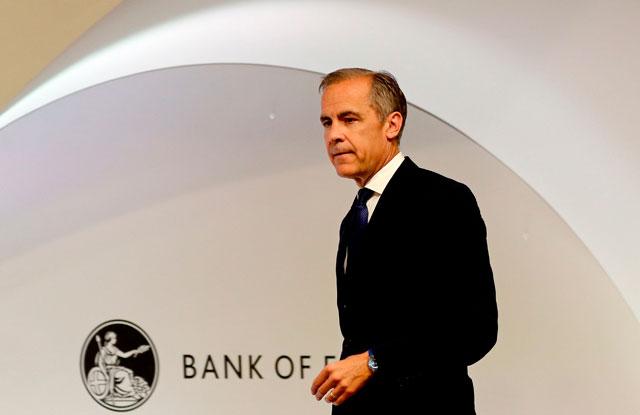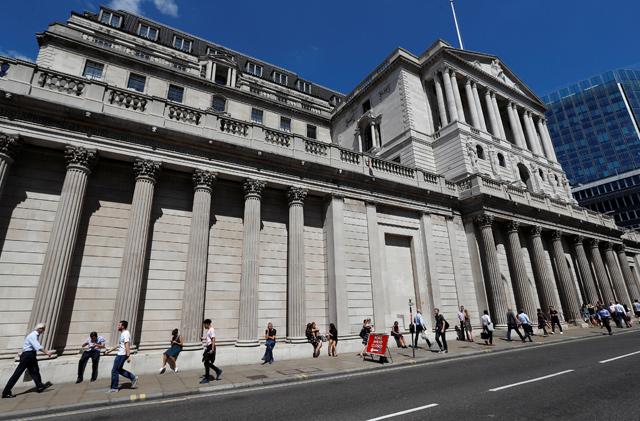You are here
UK shakes up Bank of England with three new top policy appointments
By JT , Agencies - Mar 18,2014 - Last updated at Mar 18,2014

LONDON — Britain shook up the Bank of England (BoE) on Tuesday, breaking the all-male grip at the top as it appointed two new deputy governors and a chief economist who has been highly critical of the banking industry.
The biggest single change in senior staff since the BoE gained independence in 1997 sees International Monetary Fund (IMF) official Nemat Shafik become its new deputy governor for markets and banking — the first woman in a top policy role since 2010.
Ben Broadbent, up until now an external member of the bank’s monetary policy committee (MPC), will step up to become deputy governor for monetary policy.
In a third move, executive director for financial stability Andy Haldane swaps jobs with chief economist Spencer Dale.
Dale had been a favourite to become deputy governor but will lose his MPC seat from June when he takes over Haldane’s role on the financial policy committee, which regulates banks.
Haldane has been unusually outspoken for a central banker, criticising banks for trying to dodge regulation and addressing anti-capitalism protesters.
The changes — made by BoE Governor Mark Carney and the government — are part of an overhaul to break down barriers between the bank’s monetary policy and bank regulation wings.
The biggest loser from the upheaval is markets director Paul Fisher who will have to give up his MPC seat to Shafik from August 1. Fisher has been under fire from lawmakers over the BoE’s handling of alleged manipulation of London’s currency market.
“The bank needed a pretty major shake-up and it is certainly getting one,” said Jonathan Portes, director of Britain’s National Institute for Economic and Social Research.
According to Portes, the new appointments should breathe fresh life into the central bank’s macroeconomics team — which had a patchy forecasting record and was too inward-looking — and that Shafik had the right temperament to tackle market abuse.
“She’s pretty tough and at the moment you need someone who is prepared to be fairly tough with the London financial sector,” he said.
But Domenico Lombardi, a former IMF board member who now works for Canadian think tank CIGI, warned that she was likely to face a steep learning curve when she arrives at the BoE.
“She will have some catch-up to do, because clearly banking and markets were not at the core of her responsibilities at the IMF,” he remarked.
New deputy governors
Prior to Tuesday’s announcement, Carney had overseen the appointment of outsiders to two other top positions at the bank.
Broadbent was formerly a senior economist at Goldman Sachs — Carney’s employer before he became a central banker. He will succeed Charlie Bean, who retires at the end of June.
Broadbent has said the failure of troubled banks to lend money to more efficient firms is one of the reasons behind Britain’s weak economic productivity since the financial crisis.
Shafik — who holds Egyptian, US and British nationality — has a background in development economics, working at the World Bank and as the top civil servant at Britain’s overseas aid department before becoming deputy managing director at the IMF.
According to an IMF statement e-mailed to The Jordan Times Tuesday, IMF Managing Director Christine Lagarde said: “I know I speak for all colleagues at the fund when I say that Minouche [Shafik] will be missed. The fact that she is leaving us to take up such an important post is testimony to her broad command of policy issues, her superb leadership and communications skills, and her global reputation.”
Shafik oversaw much of the fund’s country work in Europe, including the programmes with Greece and Portugal, as well as Arab countries in transition, the statement said, adding that she also led the efforts to integrate the IMF’s work on capacity building and technical assistance.
“I have highly valued Shafik’s contribution as part of the senior team and I have greatly appreciated her advice, candour, and loyalty. She is a dear colleague and, I am proud to say, a dear friend as well,” Lagarde noted.
Shafik will stay on until mid-June as special adviser to the managing director, the IMF said.
She joined the fund as deputy managing director in April 2011 after resigning her position as permanent secretary of the UK Department for International Development. Holding a M.Sc. in Economics from the London School of Economics and a D.Phil. in Economics from Oxford University, she has also served as the youngest ever vice president at the World Bank where she helped get private money into infrastructure projects.
Shafik will be responsible for the BoE’s eventual exit from its quantitative easing policy, under which it amassed 375 billion pounds ($624 billion) of government bonds.
She will also steer a review of the way the central bank gathers intelligence on markets, which has come under scrutiny recently after claims that London traders manipulated key foreign exchange rates.
Since taking office in July, Carney has been keen to increase the number of women in senior roles at the BoE.
BNP Paribas economist David Tinsley said the appointments were a surprise, and would add “a degree of raised uncertainty” about when the central bank would start to lift interest rates from their record low of 0.5 per cent.
Little is known about Shafik or Haldane’s views on monetary policy, though Portes said she had been sympathetic to the IMF’s move away from its highly orthodox policy prescriptions.
Broadbent and Dale both voted against the bank’s final expansion of asset purchases in July 2012, while Fisher was part of a dovish minority under former governor Mervyn King who wanted more asset purchases up until King’s departure in June.
Broadbent is the first external member of the MPC to take up a position as deputy governor. He will be responsible for the BoE’s analysis of Britain’s economy, as well as bank notes.
Britain’s finance ministry also named Anthony Habgood as chairman of the Court of Directors, which supervises the central bank. Habgood is chairman of brewer Whitbread and publishing company Reed Elsevier.
Habgood succeeds David Lees, whose term expires on July 1.
Related Articles
LONDON — The Bank of England (BoE) on Thursday left its key interest rate at 0.50 per cent as it slashed the growth forecast for the B
An asset management firm has been told to repay customers after using their money to settle its market data bill, Britain’s Financial Conduct Authority (FCA) said in a crackdown on commission charges.
LONDON — The Bank of England (BoE) appears set on Thursday to hike interest rates to combat high inflation, as it eyes fallout from both Bre

















